On August 2, 1928, two quite ordinary people began a life together. Each brought a heritage; each cherished a hope. Marion Isabel Burk brought from Richmond, Virginia, a gentleness, kindness, and simplicity which grew and deepened as her life progresses. She also brought the seeds of a constancy of spirit which grew into one of her most charming attributes. Henry Joseph Knott of Baltimore, Maryland, brought a determination and drive that kept him continually breaking new ground. The courage of his convictions and some red-headed “true grit” marked him as an achiever.” - Sister Kathleen Feely
Label
Ordinary Beginnings
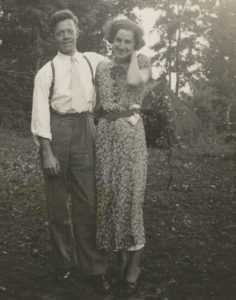
Henry J. Knott was born on November 2, 1906, the eldest of six boys. His father was a carpenter, working incredibly long hours, a family trait that would be passed down to Henry. Henry was a mischievous boy, often breaking rules not because he meant to do harm, but rather because he preferred to do things his way.
Marion Isabel Burk was born on April 24, 1910 in Richmond, Virginia. Orphaned by the age of 11, she moved to Baltimore to live with her aunt and uncle, where she had a difficult childhood. Her new guardians charged her with many chores, including cooking and looking after the children in a small boarding house run by the family.
Henry and Marion met through a blind date arranged by a friend. They were married on August 2, 1928. This partnership would last 67 years during which they experienced great joys and great sorrows.
Label
Building a Family
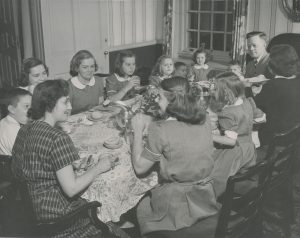
The Knott family was soon multiplying. Henry and Marion welcomed Mary Patricia, Marion Isabel, Martha Alice, Margaret Celeste, Ann Carlisle, Henry Joseph, Jr., Catherine Philemon, Rose Marie, Sarah Lindsay, Francis Xavier, and James Frederick. In 1948 the Baltimore Sun ran a newspaper article about the Knott family, which they nicknamed “The Stork Club.” The article described the ins and outs of family life with eleven children. Weekly, they consumed 28 loaves of bread, 84 quarts of milk, 13 pounds of ham, and 10 dozen eggs. The arrival of Martin Gerard and Mary Stuart expanded The Club to thirteen.
Mr. Knott’s children describe him as a hardworking, driven, and generous man who prioritized his commitment to his faith and his family. Mrs. Knott is described by her children as being a dedicated wife and mother, and a woman of incredible compassion.
Label
Building a Business
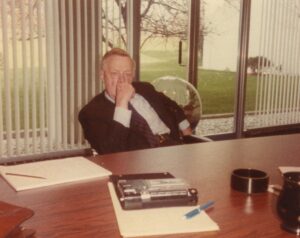
From truck driver to grocer, Henry did what he could to make ends meet. A banker gave Mr. Knott a chance to move ahead by loaning him money to start a building company. In 1946, Henry developed his first town home on East Federal Street, after which more home and apartment construction jobs followed. He continued brickwork with contacts from Johns Hopkins and the Baltimore City Housing Authority. He was the first developer in Baltimore to employ the practice of prefabricating wall panels in a factory, and then sending them out to construction sites.
While Henry's hard work and ingenuity was creating wealth for the family, he was not one to rest nor waste the opportunities he had been granted. Of his work ethic, one grandson said, “My grandfather was either working or he was working or he was working, and that’s just what he did.”
Community Investment
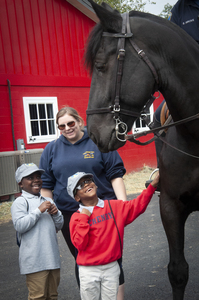 Mr. and Mrs. Knott cared deeply about their community and enjoyed seeing the impact of their giving in the Archdiocese of Baltimore. They gave in large ways and in small ways – from donating land to Johns Hopkins, to donating produce from the family farm to those in need. And they strongly supported the programs and servants in the Catholic Church that were working to meet the needs of those in Baltimore.
Mr. and Mrs. Knott cared deeply about their community and enjoyed seeing the impact of their giving in the Archdiocese of Baltimore. They gave in large ways and in small ways – from donating land to Johns Hopkins, to donating produce from the family farm to those in need. And they strongly supported the programs and servants in the Catholic Church that were working to meet the needs of those in Baltimore.
The Knott's contributions and kindness did not go unnoticed, although they never asked for recognition. Said close personal friend Frank Gunther, “He was just a wonderful example of anybody who really believed in community, who wanted to serve the community, and did so in such a way that he didn’t want a whole lot of recognition. He didn’t want a lot of fanfare.”
Preserving the Legacy
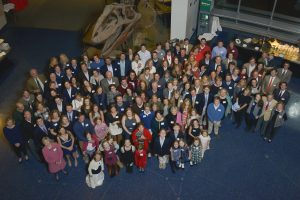
Today, their legacy lives on in the work of the Marion I. & Henry J. Knott Foundation. The Foundation exists because of their desire to see their wealth continue to make a difference in the Archdiocese of Baltimore, and to see their family working together in a legacy of giving intended to last forever. Three generations of Knott family members honor them by contributing their time and energy to the Foundation that bears the family name.
